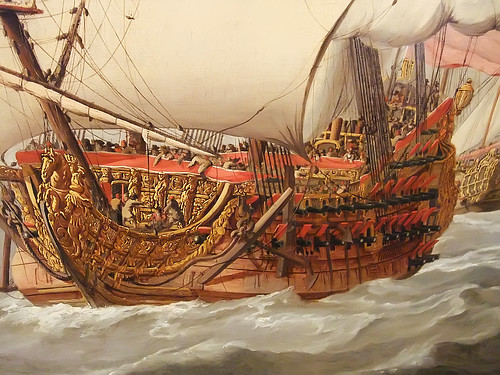
Details of British warships by Willem Van de Velde the Younger and John Christian Schetky (4), a photo by mharrsch on Flickr.
At its height, the British Empire was the largest empire in history and, for over a century, was the foremost global power, says Wikipedia.[1]
By 1922 the British Empire held sway over one-fifth of the world's population.[2] The empire covered almost a quarter of the Earth's total land area.[3][4] As a result, its political, legal, linguistic and cultural legacy is widespread.
At the peak of its power it was often said that "the sun never sets on the British Empire" because its span across the globe ensured that the sun was always shining on at least one of its numerous territories.
During the Age of Discovery in the 15th and 16th centuries, Portugal and Spain pioneered European exploration of the globe, and in the process established large overseas empires. Envious of the great wealth these empires generated, England, France and the Netherlands began to establish colonies and trade networks of their own in the Americas and Asia.[5]
The British Empire began to take shape during the early 17th century, with the English settlement of North America and the smaller islands of the Caribbean, and the establishment of private companies, most notably the English East India Company, to administer colonies and overseas trade.
Settlements were successfully established in St. Kitts (1624), Barbados (1627) and Nevis (1628).[25] The colonies soon adopted the system of sugar plantations successfully used by the Portuguese in Brazil, which depended onslave labour, and—at first—Dutch ships, to sell the slaves and buy the sugar.[26] The increasingly healthy profits of this trade were soon restricted to English ships.
From the outset, slavery was the basis of the British Empire in the West Indies. Until the abolition of the slave trade in 1807, Britain was responsible for the transportation of 3.5 million African slaves to the Americas, a third of all slaves transported across the Atlantic.[37] To facilitate this trade, forts were established on the coast of West Africa, such as James Island, Accra and Bunce Island. In the British Caribbean, the percentage of the population of African descent rose from 25 percent in 1650 to around 80 percent in 1780, and in the 13 Colonies from 10 percent to 40 percent over the same period (the majority in the southern colonies).[38]
For the slave traders, the trade was extremely profitable, and became a major economic mainstay for such western British cities as Bristol and Liverpool, which formed the third corner of the so-called triangular trade with Africa and the Americas. For the transported, harsh and unhygienic conditions on the slaving ships and poor diets meant that the average mortality rate during the middle passage was one in seven.[39]
The Battle of Plassey, 1757, saw the British defeat the Nawab of Bengal and his French allies, leaving the Company as the major military and political power in India.[51] In the following decades it gradually increased the size of the territories under its control, either ruling directly or via local rulers under the threat of force. British India eventually grew into the empire's most valuable possession, "the Jewel in the Crown"; covering a territory greater than that of the Roman Empire, it was the most important source of Britain's strength, defining its status as the world's greatest power.[53]
Since 1718, transportation to the American colonies had been a penalty for various criminal offences in Britain, with approximately one thousand convicts transported per year across the Atlantic.[64] Forced to find an alternative location after the loss of the 13 Colonies in 1783, the British government turned to the newly discovered lands of Australia. The Australian colonies became profitable exporters of wool and gold,[70] mainly due to gold rushes in the colony of Victoria.
Under increasing pressure from the British abolitionist movement, the British government enacted the Slave Trade Act in 1807 which abolished the slave trade in the empire.
Following the defeat of Napoleonic France in 1815, Britain enjoyed a century of almost unchallenged dominance, and expanded its imperial holdings across the globe. Increasing degrees of autonomy were granted to its white settler colonies, some of which were reclassified as dominions.
WWI placed enormous financial and population strain on Britain, and although the empire achieved its largest territorial extent immediately after the war, it was no longer a peerless industrial or military power.
After the end of the Second World War, as part of a larger decolonisation movement by European powers, Britain granted independence to most of the territories of the British Empire. This process ended with the political transfer of Hong Kong to China in 1997.
